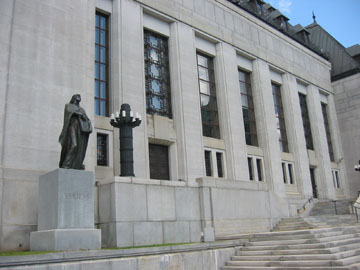 The Supreme Court of Canada will hear the following six appeals this week:
The Supreme Court of Canada will hear the following six appeals this week:Nov. 15 — Federal Court — City of Calgary v. R.
Taxation: The dispute relates to a new city transit system and the City of Calgary claiming tax credits on purchases made for its construction. According to the City Transportation Act, a municipal transit service is exempt from tax credits but the city disagreed.
Nov. 16 — Quebec — R. in Right of the Province of Newfoundland and Labrador v. Abitibibowater Inc.
Commercial law: Newfoundland and Labrador’s minister of Environment and Conservation issued five orders requiring Abitibibowater Inc. to remediate its industrial sites. When the orders were issued, Abitibibowater had filed for protection under the Companies’ Creditors Arrangement Act. The issue is whether a statutory duty to remove environmental contamination can be extinguished under the CCAA.
Nov. 17 — Federal Court — Public Service Alliance of Canada v. Canada Post Corp., Public Service Alliance of Canada v. Canada Post Corp., Canadian Human Rights Commission v. Canada Post Corp. (three hearings related to same case)
Administrative law: In 1983, the Public Service Alliance of Canada filed a complaint against Canada Post Corp. alleging female employees were being discriminated over their wages when compared to male employees. The Canadian Human Rights Commission conducted an inquiry and found that there was a wage difference. It referred the complaint to the Canadian Human Rights Tribunal. Its decision was set aside on judicial review and the complaint was sent back to the tribunal suggesting that it be dismissed.
Nov. 18 — British Columbia — R. v. Yat Fung Albert Tse
Charter of Rights and Freedoms: According to the Criminal Code, peace officers can intercept private communications without judicial pre-authorization if the officer believes it’s an urgent situation or it would prevent an unlawful act. In this case, police officers used wiretaps in the alleged kidnapping of three people. At trial, the accused challenged the constitutional validity of wiretaps and whether wiretapping without a warrant in urgent situations breaches the Charter’s protection against unreasonable search and seizure.







